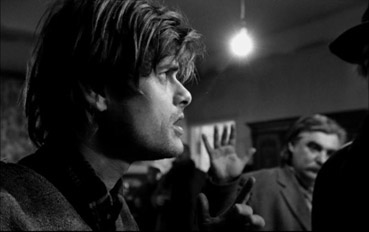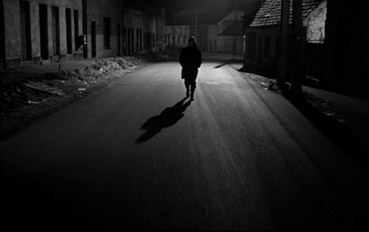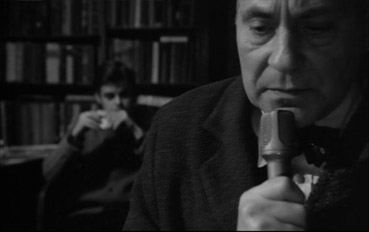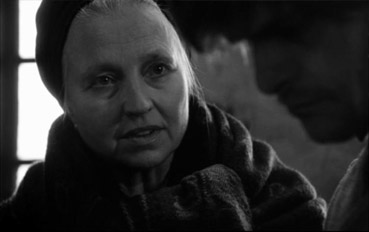"Eventually nothing remains of us except our films – strips of celluloid on which our shadows wander in search of truth and humanity until the end of time."
|
Béla Tarr, during preproduction for Damnation, 1987. |
You will have no doubt become tired of the current vogue for single quote-ready adjectives on advertisements which profess the film to be "unforgettable," "amazing," "mesmerising," or, when erring toward the melancholy, "haunting" writ large on the nearest billboard, bus stop or frequently, the bus itself. Made to draw the eye and ultimately, your hard-earned cash, the majority of the time, you will probably leave the cinema or pop open the DVD draw feeling more than a little short-changed, having realised so few films live up to the hyperbolic praise bestowed upon them. Thankfully, once in a while a film is deserving of such grand phrases and does live up to the whisperings of greatness: Béla Tarr's Werckmeister harmóniák (Werckmeister Harmonies).

Unlike the aforementioned promoters, I am not in the habit of making bold, oft hollow statements. In truth, because of such statements, I have often been burnt by bad cinematic experiences, countless hours of my life lost to films I dare not name. As a result, it takes a lot for me to be impressed, and impressed I was. If you are stuck in a cinematic rut, Harmonies will certainly shake you out of it. This film will either send you screaming to your DVD collection for the nearest dose of fast-paced, explosive Bruce Willis, finding Tarr slow and boring, or conversely, it will send you into raptures, wanting to seek out more of the Hungarian director's work because his film spoke to you in a way you had forgotten existed. For good or ill, you will be changed by what you see.
Cinemagoers are creatures of habit, even if we are drawn toward the off-beat, more at home with art house than the multiplex, we do become trained to seek out certain kinds of cinema, be it by style, narrative, actor or director. The work of Béla Tarr stands on its own simply because it refuses to adhere to such conventions. As such, he is a very specific and acquired taste; a taste that is so polarising in opinion that there is no such thing as middle ground.
The reasons why Werckmeister Harmonies does this are, as the director himself has often noted, incredibly difficult to explain. In short, writing the experience of this film in words instead of using pictures or video makes it hard to do it justice. So much of the pleasure audiences have derived from Tarr's work stems from the images we are confronted with; this is cinema, but not quite as we know it.
Fittingly, its two-and-a-half hour runtime passes in the blink of an eye. For those initiated to Tarr's brand of slow cinema, whether drawn by the noir undertones of Kárhozat [Damnation], the dark landscape of A Londoni férfi [The Man from London], or are one of the hardened cinephiles who carry the badge of cinematic survival given for making it to the final moments of his beautiful but marathon-esque epic Sátántangó [Satan's Tango] that might seem like something of an oxymoron. It seems near impossible for a hundred and forty five minute film to contain just thirty-nine shots and not feel every second of its excruciatingly slow pacing and frustrating approach to storytelling. And yet, it works, reeling you into its darkness, peering, tempted, and curious before you make the descent into the unknown.

In such a context, the conventions of character and plot seem almost superfluous, since it makes everything seem far too simple, when Harmonies and the beauty of it stems from its immense layers of complexity, which are revealed over the course of time. The story itself is taken from László Krashnahorkai's The Melancholy of Resistance, adapted by the author, Tarr, and his wife and co-director Ágnes Hranitzky. Centred upon the arrival of a strange circus attraction, incorporating a stuffed whale and a mysterious man known only as The Prince, brings unrest to a quiet Hungarian town. Intrigued by the whale, the townspeople gather in the square, where the resident philosopher and dreamer, János (Lars Rudolph), is drawn to the majestic animal and its watchful gaze. Stuck in dreams of another kind, is Gyuri (Peter Fitz), obsessed with the theories of German composer Andreas Werckmeister to the exclusion of the rest of the world. His ex-wife, Tünde (Hanna Schygulla), enlists János to help persuade Gyuri away from his studies, wanting his help to form a committee to restore order to the town before things escalate beyond repair.
The very pace of the film, or rather the lack thereof, makes you search the images and look for more, which in turn makes trying to decipher what is happening and what that may mean extremely difficult. But, at times, the film is so emotionally affecting that the particulars of logic and meaning seem to matter little. This is more than the sum of its parts. What you see on one occasion may be replaced by something else in a later viewing, making it feel as if the film is never quite over, with ever more to discover. The shots are so few; it is easy to recognise repetition and easier still to reconstruct them in your head days later, akin to turning a flip book or watching Zoetrope at the slowest speed.
My allusions such to primitive machines in order to describe Tarr's very distinctive visual style may sound like I believe Tarr's cinema to be the same: crude and unimaginative, but it could not be further from the truth. The director has frequently stated that he believes the language of cinema to be a limited one, and while I may not entirely agree, I believe that it is this reduced, almost elemental quality to Tarr's work which makes it so powerful. In peeling back the layers of cinema and pairing it down to basic elements, making it look more like a painting or a play, with the depth tableau staging affords, the artifice takes a back seat, and therefore we not only see more, but we also feel more. You catch the minutia often missed in the acceleration of the edit: expressions on faces as thoughts and ideas dawn; shifts in movement; or background details. Sometimes, the focus of the camera is not related to Tarr's intent at all. Such tactics, while they can be frustrating and breed confusion and perhaps contempt, point toward the fact that we are not only seeing and feeling cinema differently, we are also experiencing them differently.

While a lot of us watch films in a passive way, from its opening moments, Harmonies makes us throw some sort of cognitive switch, making our brains work and think in a way that makes the process watching an active and therefore infinitely exhausting one. If mainstream cinema means we sleep, fed streams of meaning and images; then Tarr's cinema is most definitely awake, simply because we have to work for everything we get.
So much of this film is conducted in darkness with lengthy silences; it feels like an artefact from another time, closer to the era of vaudeville, Chaplin and Keaton than the millennial timeframe of its making. The mere fact it is shot in black and white (Tarr's preferences aside, it just would not work in colour) helps along the feeling of antiquity, and the film carries a definite European air, recalling the poverty-stricken oppressed workers of Eisenstein's Stachka [Strike] and Lang's Metropolis or the violent stirrings of Pontecorvo's La battaglia di Algeri [The Battle of Algiers] and Bronenosets Potyomkin [Battleship Potempkin] Odessa steps and all. And yet, there are elements within the film which stand out in opposition to such ideas, stubbornly contravening them. The presence of televisions, video recorders and helicopters feels anachronous, jarring and surprising. As the previous point neatly illustrates, Harmonies is in fact more to do with discord and contradiction than unity and flow. In fact, the only unified about it is its aesthetic even this a somewhat contradictory statement, since it was worked on by no less than seven cinematographers, which makes it an extraordinary achievement in its own right.
There are many things about this film which should not work together but do, recalling realist and surrealist elements which are similarly fused in Issaac Julien's Looking for Langston. Béla Tarr has made a career of making oil and water mix, revelling in its rainbow hues. On the one level Tarr's film is realist, earthy, bound to its country and people; one can almost smell the mud, the grass and the smoky town square air, full of real people, chosen for their personality rather than their ability to perform. On another, in complete contrast to this, is its ethereal, dream-like, meditative structure. Otherworldy and out of time, it makes one feel like we're slipping into the mind's eye; perhaps the mind of Tarr, perhaps the fragile mind of the inquisitive János whose spirit and thirst for knowledge has been broken after seeing far too much. The last, but no less important level is that of emotion. We can see the anguish in the lines on these people's faces, and see it resonate in their eyes as they appeal to Gyuri, browbeaten and downtrodden by circumstance, suffering the shortages of power and fuel, but we can also feel their every emotion, watch their rage build, infecting them. One is never quite able to shake the sense of grim foreboding which hangs over this film like a dark cloud, the kind which turns János' celestial and metaphysical musings into a nightmare, which sends him back careening back to earth with an almighty bump. Like Icarus before him.

Werckmeister Harmonies is like travelling down a tunnel with a tiny torch, illuminating fragments of what is to come with no idea of what lies in the darkness beyond the reach of its beam; like a rollercoaster, run backwards; a ghost train full of hidden scares and surprises. Lars Rudolph's János is the lynchpin in this strange, dark world. He, for all intents and purposes is our stand in, navigating and searching. If we were to place a mirror next to us while watching this film, and glance away at any given moment, we would look just like him, alternating from awe and curiosity to concern, shock and even disgust at depths we can sink to.
For that all that is unknown and uncertain in this film, I do know one thing for sure; its images and all they stirred in you will circulate in your head long after the credits roll.
Framed 1.66:1, the points lost for being non-anamorphic are regained for the quality of the image, which boasts a crisp level of detail, a lovely tonal range and excellent contrast, with the deepest of blacks, especially in the night shots. Some of the background whites in the hospital are burned out but deliberately so, as the skin tones in these shots are spot on. Dust spots are rare and only visible at all in large areas of black.
The Dolby mono 2.0 soundtrack is clean and clear and without a hint of distortion. The music plays particularly well.
The disc carries one extra, an Interview with Béla Tarr (38:12). Held back in 2001, during a Tarr retrospective at the NFT, and chaired by film critic Jonathan Romney, with translation from Lázló Hackenast, this is an intriguing discussion which spans Damnation to Werckmeister Harmonies. Clearly more comfortable with a camera than a microphone, Tarr often struggles to describe his work without visual means. What is not lost in translation however, is Tarr's passion for cinema and his homeland.
In a culture obsessed by meaning, the director's resistance to allegorical and metaphorical interpretations being placed on his work is refreshing. The interview proves, if there were any doubt, the figure of Tarr is just as infinitely interesting as the films he makes. One feels that Romney has just scratched the surface of this incredibly complex figure and his importance to contemporary cinema.
While the disc offers the same features found on the earlier Artificial Eye release from 2003, issues with the subtitling of the final scene and aspect ratio inconsistencies have thankfully been rectified. These corrections alone make it a worthy addition to any Tarr collection.
Werckmeister Harmonies is art cinema at its most extreme, at times quiet and pensive, other times menacing and shocking. To watch the story unfold is both maddening and compulsive.
Whether you love or loathe this extremely individualist filmmaker and the challenges his work presents, one cannot discount the magnitude of it. The fact that Tarr provokes such polarised opinion is testament to his prowess and power.
Memorable cinema is defined sometimes by iconic dialogue, scenes, the beauty of images the viewer can call to mind or indeed the emotions it inspires; perhaps most of all, these films are the kind which allows us to use the projection screen as a trap door to escape to another world. What an escape Tarr's world is.
|